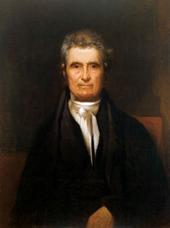John
John Marshall
John Marshall (September 24, 1755 – July 6, 1835) was an American statesman and jurist who shaped American constitutional law and made the Supreme Court a center of power. Marshall was the fourth Chief Justice of the United States, serving from February 4, 1801 until his death in 1835. He served in the Continental Army from 1776 to1781, attaining the rank of captain, served in the United States House of Representatives from March 4, 1799 to June 7, 1800, and, under President John Adams, was Secretary of State from June 6, 1800 to March 4, 1801. Marshall was a native of the Commonwealth of Virginia and a leader of the Federalist Party.
The longest serving Chief Justice in Supreme Court history, Marshall dominated the Court for over three decades and played a significant role in the development of the American legal system. Most notably, he established that the courts are entitled to exercise judicial review, the power to strike down laws that violate the Constitution. Thus, Marshall has been credited with cementing the position of the judiciary as an independent and influential branch of government. Furthermore, Marshall made several important decisions relating to Federalism, shaping the balance of power between the federal government and the states during the early years of the republic. In particular, he repeatedly confirmed the supremacy of federal law over state law, and supported an expansive reading of the enumerated powers.
Read more
.. John Marshall: Citizen Statesman Jurist
Supreme
Supreme Court opinions
Marshall wrote several important Supreme Court opinions, including:
Marbury v. Madison
(1803)
Fletcher v. Peck
(1810)
McCulloch v. Maryland
(1819)
Dartmouth College v. Woodward
(1819)
Cohens v. Virginia
(1821)
Gibbons v. Ogden
(1824)
Worcester v. Georgia
(1832)
Barron v. Baltimore
(1833)
Marshall served as Chief Justice through all or part of six Presidential administrations (John Adams, Thomas Jefferson, James Madison, James Monroe, John Quincy Adams and Andrew Jackson), and remained a stalwart advocate of Federalism and a nemesis of the Jeffersonian school of government throughout its heyday. He participated in over 1000 decisions, writing 519 of the opinions himself.
swearing in President Andrew Jackson
home in Richmond
Try the BEST MySpace Editor and MySpace Backgrounds at MySpace Toolbox !
